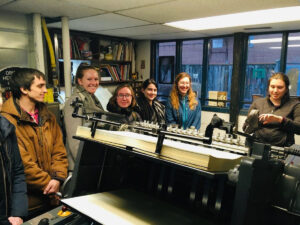*only students admitted to the BHPC program can enrol in BKS courses.
BKS 1001H: Introduction to Book History
Prof. Matthew Wells (Faculty of Information), Fall 2025, Mondays 2:00 – 5:00 pm, Maclean Hunter Room, Thomas Fisher Rare Book Library.
This foundational course, required for all BHPC students in their first term, will introduce students to basic topics such as the semiotics of the book; orality and writing systems; book production from manuscript to computer technology; the development of printing; the concept of authorship; copyright; censorship; the economics of book production and distribution; libraries and the organization of information; principles of bibliographical description; print in other formats (newspapers, magazines, advertisements, etc.); reading and readership; editorial theory and practice.
Sample syllabi:
- (Fall 2023) Fernández_BKS1001H_f2023.pdf
- (Fall 2024) Keymer_BKS1001H_f2024.pdf
BKS 1002H: Book History in Practice
Prof. Yulia Ryzhik, (Department of English), Winter 2026, Mondays 2:00 – 5:00 pm, Colin Friesen Room, Massey College.
Offered in the Winter Term and required for all Master’s students in the BHPC Collaborative Specialization, this course develops many of the themes from BKS1001H in a seminar format. The approach of the course reflects what David Greetham calls “the disciplinary interrelatedness of all aspects of the study of the book” (Textual Scholarship: An Introduction, p. 2). The course consists of seminars on key topics in book history, punctuated by case studies of particular books, events, and debates. These case studies are designed to pull together ongoing threads of inquiry from the readings, and to allow students to work outward from specific artifacts to general questions. Prerequisite: BKS1001H.
Sample syllabi:
- (Winter 2023) Ryzhik_BKS1002H_w2023.pdf
- (Winter 2024) Galey_BKS1002H_w2024.pdf
BKS 2000H: Advanced Seminar in Book History and Print Culture
An advanced seminar required for all doctoral students in the BHPC Collaborative Specialization, this course will vary in content from year to year depending upon the expertise of the faculty member appointed to lead it. The term-paper research project will be open to work in all disciplines, periods, and languages in consultation with the instructor. Prerequisite or corequisite for BHPC students: BKS1001H. May be available without prerequisite to students outside the program by permission of instructor.
2025–2026 seminar:
The Idea of the Edition in the Twenty-First Century
Prof. Alan Galey (Faculty of Information), Winter 2026, Thursdays, 1:00 – 4:00 pm, Colin Friesen Room, Massey College.
Book history and other forms of textual scholarship in the twenty-first century deal with a greater range of texts and artifacts than ever before. Over the course of the twentieth century, the professionalization of bibliography led to a boom in the production and theorizing of scholarly editions. In the past few decades, new digital technologies and publication systems have changed the form that scholarly editions can take, leading to an exciting period of experimentation with digital tools which is still ongoing. However, we have also seen the widespread circulation of born-digital texts of various kinds (e.g. ebooks, literary apps, video games, digital fanfiction), which means that digital texts, not just tools, are also opening new horizons for scholarly editing—though actual scholarly editions of born-digital texts have been slow to materialize. The professional and social contexts for reading and scholarship are also changing, especially with the mainstreaming of generative AI. Amid all these changes, it is a good time to reassess the idea of the edition as a form of cultural production with traditions measured in centuries, not just years and decades.
Scholarly editions, whatever form they take, reproduce texts in ways that reflect an understanding of their histories, and incorporate scholarship in the form of editorial paratexts (e.g. annotations, introductions) to aid readers. But the curation of cultural materials also extends beyond scholarly editing in academic contexts. An operative idea of the edition can sometimes be found among fan communities and pro-am digital archivists, whose recovery and preservation work may be understood as forms of textual scholarship in the wild (e.g. Unseen64.net). In this course, students will explore the tradition(s) of scholarly editing alongside emergent practices that could be considered forms of editing by other names. We will read key works in the history and theory of scholarly editing, including closely connected disciplines such as textual criticism, feminist bibliography, and the digital humanities. We will also look at case studies where scholarly editions have ignited illuminating controversies or become boundary-pushing experiments, both print and digital. But our reading and discussion will also draw upon adjacent fields often overlooked by traditional literary editorial theorists, such as film studies, music studies, videogame studies, performance studies, and the book arts (incl. artists’ books). Overall, we will be guided by the premise that some of the most interesting forms of editing—and some of the most promising innovations—can be found in unexpected places.
Note: Students who study all periods and traditions are welcome in the course, whether they work with recent born-digital materials past or digital editions of texts from the distant past—or texts from all points in between. Course assignments will be structured to support students in developing their own creative-critical editing projects throughout the course, which will take the form of their own edition (or prototype) of a text of their choice—whether in physical, digital, or hybrid form.
.
A list of previous offerings of BKS 2000H can be found here.
BKS2001H: Practicum in Book History and Print Culture
An individual project for PhD students intended to serve as a bridge from coursework to the dissertation, taken under the supervision of a BHPC-affiliated faculty member. The practicum project may lead directly into dissertation research, or may allow the student to explore a side project, and the student’s approach should be decided in consultation with the PhD supervisor and BHPC Director. The primary learning outcome of any BKS 2001H project should be for the student to be able to translate individual research interests into scholarly projects that engage with methods and concepts from the field of book history, broadly defined. Proposals from BHPC Master’s students may be considered under exceptional circumstances; interested Master’s students should email the Director and Program Coordinator well in advance of the deadline to consult about eligibility.
Timing. Enrolment is normally limited to doctoral students in the BHPC Program. BKS 2001H should be completed by the end of the student’s coursework period within the home unit (normally Year 1), or in the summer immediately thereafter. Please note that eligibility for the BHPC Student Research Awards and BHPC Printing Apprenticeships at Massey College is conditional upon timely enrolment in BKS 2001H.
Types of Projects. Examples of BHPC practicum projects include exhibitions and/or accompanying catalogues, online exhibitions or other digital projects, bibliographies, scholarly editions of short works and other forms of in-depth case studies, and printing or other projects in conjunction with the Massey College Library’s Bibliography Room. A list of completed practicum projects may be found here. Students are welcome and encouraged to expand upon the forms of previous practicum projects, and to propose hands-on projects that take advantage of the resources available through Massey College, the University of Toronto, and the city’s book arts community, and are advised to consult with librarians and archivists as they plan their projects. It is possible for a student to work closely with a non-faculty mentor or collaborator, as long as the official practicum supervisor holds an SGS appointment and BHPC affiliation. (The BHPC Director can add new faculty members to the affiliated list upon their request, provided the faculty member’s research has a demonstrable connection to BHPC’s fields of study, broadly defined.)
Students whose projects incur expenses for materials (e.g. special paper for a printing project) are encouraged to contact the Director and Program Coordinator.
Grading and Structure. The practicum is a graded course. The student and supervisor must consult in advance on how the final grade will be determined, and make the grading structure (including percentages for graded deliverables) clear in the practicum proposal. The participation grade, if any, may not exceed 20% of the course grade. It is recommended that students and supervisors avoid single end-of-term deliverables worth more than 80%, and instead break large assignments into smaller, separately graded stages (e.g. a preliminary outline, annotated bibliography, etc.) so that students receive feedback early in the project. (See also the section on reading and research courses, under “Alternate Course Types,” in the SGS Policy on Graduate Courses & Other Academic Activities.)
Submitting a Proposal. The practicum proposal must be submitted to the Program Coordinator (bookhistory@masseycollege.ca) by November 1 for a Winter Term course and April 1 for a Summer or Fall course. The proposal should be a single PDF document, and should include the following information:
- practicum title
- name of practicum supervisor
- 500-word description of the project, detailing its scope, methods, goals, and the collections and resources it will draw upon
- a brief bibliography of primary and secondary sources
- grading structure
The practicum supervisor should also send the Program Coordinator an email confirming that they’ve read and approved the proposal. Proposals will be reviewed by the Program Director and Committee, with the results communicated to students normally within two weeks of submission. Students must then register for the course on ACORN and adhere to the usual SGS schedule for the session concerned.
Examples of successful proposals may be requested from the Program Coordinator.
Final Grade Submission. Supervisors must submit final course grades to the Program Coordinator at least 10 business days prior to the SGS grade submission deadline for the term (see the SGS listing of sessional dates for specific deadlines). Please note that outside of serious health or personal emergencies, there is normally no flexibility on SGS grade submission deadlines. Supervisors and students should determine assignment deadlines accordingly.


